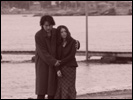Tokyo Sonata
- Year
- 2008
- Original title
- Tokyo Sonata
- Alternative title
- トウキョウソナタ
- Director
- Cast
- Running time
- 119 minutes
- Published
- 17 May 2008



by Tom Mes
Kiyoshi Kurosawa's previous film Retribution (Sakebi, 2006) carried a distinct air of farewell. Farewell to a genre that its director loved intensely but which seemed to become an increasingly restrictive straitjacket for one of contemporary cinema's greatest creative souls. Shot as an entry in Ring producer Taka Ichise's U.S.-funded J-Horror Theater series (which also included Hideo Nakata's period horror Kaidan and Kurosawa protégé Takashi Shimizu's Reincarnation / Rinne), Retribution contained many an overt allusion to Kurosawa horror films of years past. Referencing everything from Cure to Séance to Pulse, it played like a brilliant showreel, a masterful retrospective glance. Kurosawa seemed to pull out all the stops one final time before hanging up his horror hat.
A two-year break later, the arrival of Tokyo Sonata seems to confirm the impression. The story of a salaryman who keeps up appearances to his family after he has been laid off, it is entirely devoid of anything vaguely supernatural. Based on a script by Australian writer/director Max Mannix (Dance of the Dragon, Rain Fall), it is reminiscent of Laurent Cantet's Time Out (L'Emploi du temps, 2001) in the central conceit of an office drone who cannot come to grips with the fact that the job around which he defined and constructed his entire life is no longer his. But anyone familiar with Kurosawa's body of work will know that it is often the very real ills of society and its people that give his films their power and their chill: the balding middle-aged man muttering to himself while waiting for his dry-cleaning in Cure, the lack of eye contact in dialogue scenes in Pulse, or the way a husband and wife brush reason aside in Séance.
Tokyo Sonata is the ultimate expression of this quality of Kurosawa's cinema. As mentioned, it contains no supernatural elements, no ghosts, killers, or monstrous flora and fauna. Yet it is without doubt the most terrifying film Kiyoshi Kurosawa has ever made. It is terrifying because it is about us. You, me, our neighbours, our colleagues, the people we cross in the street. All it takes for the horror to emerge is for people to realise the madness of the world they contributed to creating. A world without mercy, where everyone is reduced to a cypher-like existence, dehumanised to performing the role they are expected to fulfill in this odd mechanism we call society: breadwinner, housewife, highschool pupil - clockwork oranges all of them and allowed to be nothing more.
So when Numata (Teruyuki Kagawa, whose big break as an actor was in Kurosawa's magnificent Serpent's Path in 1998), finds himself out of a job, he feels the very foundations upon which rests his existence toppling. His self-worth, his authority, his role within the family, his justification for demanding his bottle of beer at dinner - they all disappear for this man who has never once in his forty-odd years stopped to wonder about his potential, his true interests, or his desires as a human being. The many family dinner scenes are the film's most frightening sections because all the repressions and frustrations that compose this supposedly ideal example of living come rippling off the screen and through the audience: in the way mother serves the countless dishes on the table, the way father pours himself a glass of beer or opens his newspaper, the way the younger son timidly asks permission to take piano lessons, and the way the elder son is rarely even there.
Every scene in Tokyo Sonata sends forth such waves and it is this which makes Kurosawa such a master. When asked once about the influence of his first mentor Shigehiko Hasumi, the director replied that Hasumi taught him that abstract things, such as feelings or emotions, can't simply be shown. You can't point a camera at them. The real task of a real filmmaker is to make these things palpable to the audience as if it were as simple as pointing a camera at them, to suggest infinitely more than he or she shows. Tokyo Sonata contains many examples of simple, mundane incidents - family dinners, job interviews, scenes from a mall, and walks in the park - but they are charged with a power to distress that is unparalleled even in Kurosawa's oeuvre. They exemplify and denounce a world gone completely astray, where people are made to build their own cages, erecting one obstructive metal bar after another in the firm belief that this will keep them safe and warm. But there is a cold current blowing through those bars and the only way to escape it is to drop your tools and get out before it's too late.
The world has finally caught up with the films of Kiyoshi Kurosawa, and it's a horrifying, frightening sight to behold. Tokyo Sonata would be unbearable if it weren't the director's masterpiece.